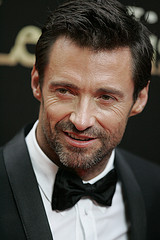Share This Article:
Return to Silver Screen Central Home page


Hugh Jackman is a much better actor than a ski jumping coach
CIn an odd bit of cinematic yin and yang, one week after Race, a movie about perhaps the best Olympic athlete of all time, arrives in the theaters, another movie about perhaps the worst ever Olympian makes its début. But while Race at least attempts to accurately portray Jesse Owens’ Olympic quest, Eddie the Eagle flies far away from the actual life story of British ski jumper “Eddie the Eagle” Edwards and makes a critical crash landing as a result.
Taron Egerton plays Edwards, who became a celebrity for finishing dead last in ski jumping for Great Britain in the 1988 Winter Olympics. In Eddie the Eagle, Edwards is depicted as an almost completely untalented klutz with an enormous desire to become an Olympian. With no coach, no experience, and no money, he goes to a training facility in Germany, where he eventually attracts the attention of Bronson Peary (Hugh Jackman), a washed-up, alcoholic, former Olympian who agrees to train Edwards.
The real life Eddie the Eagle was a moderately talented amateur athlete who simply wasn’t of Olympic caliber, except by qualifying in an event in which Britain hadn’t competed in over 50 years. That story endeared him to his countrymen and the Olympic crowds, but it apparently wasn’t sensational enough for director Dexter Fletcher and his screenwriters. Instead, they transform Edwards into a hapless buffoon who stands on top of a moving minivan and mentally prepares himself for his jumps by fantasizing about having sex with Bo Derek. By scrapping Edwards’ life story (and completely inventing the character of Peary), the filmmakers turn Eddie the Eagle into an English version of The Bad News Bears. Sadly, the endless clichés detract from the real drama in the film, the prospect that Edwards could break his neck at any time. Fletcher does manage to make that point, thanks to some often spectacular ski jumping footage and stunt work. Fortunately, the movie does capture Edwards’ natural charisma, thanks to a winning performance by Taron Egerton. In addition, Christopher Walken adds some badly needed dramatic weight when he shows up in a surprisingly subdued and effective last act cameo as Peary’s former coach. But all the acting talent and amazing camera work in the world can’t overcome a completely formulaic, poorly executed story. In the moviemaking Olympics, this bad plot form costs Eddie the Eagle any chance at a medal.
Continue reading on Eddie the Eagle: Mini-review




Recent Comments